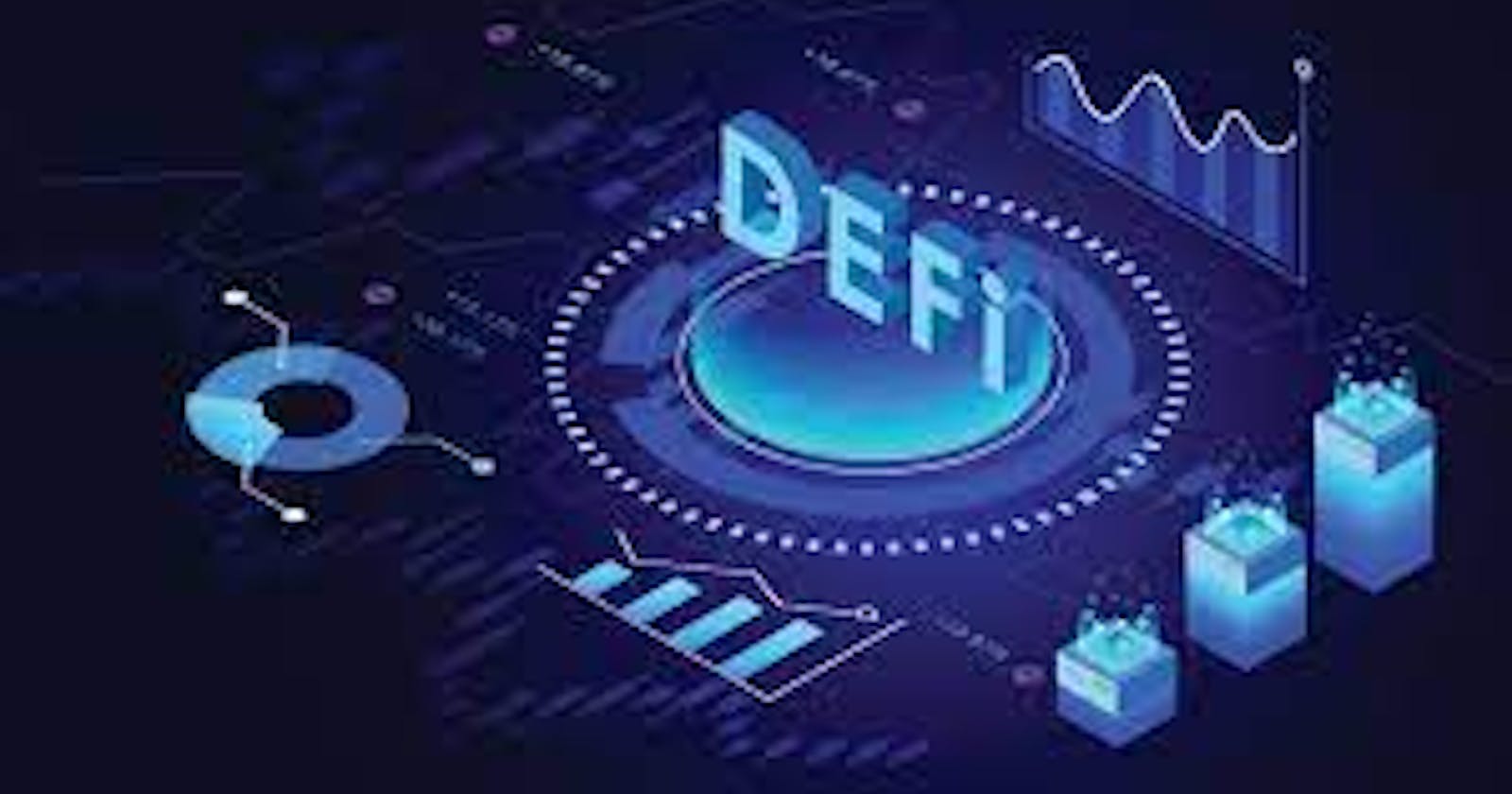"Defi stands for decentralized finance, and it is an alternative to traditional finance where a company, bank, or fund is in charge of your money. In Defi, your money is entirely under your control.
In the use of this new emerging technology, Defi expands the possibilities of cryptocurrency so that it goes beyond just currency, and generates sophisticated systems with numerous applications, commonly known as decentralized apps, or dApps, which we'll discuss in a moment.
The term Defi was coined in 2018 by a group of entrepreneurs and Ethereum developers looking to open up finance applications. It resembles the word defy, which is intentional.
How Did Defi Start?
The first exchange of goods and services was barter, but as humans evolved, economies also evolved. We invented currency to facilitate the exchange of goods and services. In turn, coins helped to create new innovations and higher levels of economic development. However, progress comes with a price.
For centuries, central governments have issued currencies that fuel our economies, eventually giving them more power as people trusted them more. However, the central authorities have breached trust occasionally, leading people to doubt their ability to manage the money.
Defi was designed to create a financial system that is open to everyone and minimizes the need to trust and rely on a central authority.
Defi can be argued to have begun in 2009 with the launch of Bitcoin, the first peer-to-peer digital money based on the blockchain network.
Bitcoin made the idea of bringing blockchain technology into the traditional financial world an essential step toward the decentralization of legacy financial systems. This was made possible by Ethereum and smart contracts, launched in 2015. As a 2nd generation blockchain, Ethereum maximized the potential of this technology in the financial industry. It encouraged businesses and enterprises to build and deploy projects that shaped the Defi ecosystem.
The development of Defi brought a lot of opportunities to put in place a transparent and robust financial system that is not controlled by one party, but the turning point for financial applications occurred in 2017 when projects began adding more functions beyond money transfers.
What Does Defi Use?
Decentralized finance uses the same blockchain technology as cryptocurrencies. A blockchain is a distributed and secured database or ledger. The blockchain is run by decentralized applications called dApps. Blockchain transactions are recorded in blocks and verified by other users. Upon agreement, the block is closed and encrypted; a new block is created that contains information about the previous block.
The blocks are linked up through the information in each subsequent block, giving it the name blockchain. There is no way to alter a blockchain because the information in previous blocks cannot be changed without affecting subsequent blocks. Along with other security protocols, this concept allows a blockchain to be secure.
**How Does Defi Work?
Defi, previously known as open finance, eliminates the middleman in financial transactions. Instead of your bank or credit card company being the intermediary between you and a merchant when you make a purchase, you own the digital currency directly.
Defi is primarily based on Ethereum, the second most popular cryptocurrency after Bitcoin.
Defi is based on the following principles:
No banks or institutions are involved, so your money is not overseen by them
The code is available for public review, so there is a level of transparency
There are open networks that transcend geographic boundaries
Users have access to many applications based on Ethereum
Even though Defi is a prominent player in the cryptocurrency discussion, it goes beyond creating an alternative digital currency. By using smart contracts, Defi replaces the role of traditional financial systems.
"Defi is all about code. Using smart contracts, your money is programmed to perform various tasks. This provides a unique opportunity for anyone with a computer and internet connection to participate in the global economy.
The most attractive aspect of Defi is that it eliminates the entry barrier for many of these financial transactions. It is no longer necessary to qualify for certain financial products or have a government or corporation manage your money.
The traditional financial system involves applying for a loan and possibly being rejected based on your credit history. You also have a bank account or investment brokerage company overseeing your money.
Using Defi's smart contracts, certain financial transactions are executed if certain conditions are met. It is possible to borrow, lend, and more with smart contracts, and the terms of the contract are written in the code. While this makes these transactions easy to use and more efficient, it can also leave them vulnerable to errors that cannot be corrected.
As a result of the smart contracts and Ethereum's ability to create applications, Defi can be used as :
As a peer-to-peer lending network
Through decentralized exchanges, where users can exchange one type of currency for another. For example, trading ether for US dollars
For betting, users place bets on how certain events will turn out
As stablecoins, which link a type of cryptocurrency with a more traditional type of currency like the dollar, to help counteract price volatility and increase stability
The Future Of Defi
Decentralized finance is here to stay, the idea was conceived around 2017, a few years after the launch of Ethereum. Defi has increasingly drawn the attention of several key opinion leaders, influencers, and investors since that time.
In general, the goal is to decentralize financial activities and give financial control to individuals. Considering that Defi has reshaped the financial space, many analysts and participants consider it to be the future.
Providing near-instant and secure transactions
Defi offers fast and secure transaction options beyond traditional methods. Traditional transaction networks are not fast, convenient, or secure. The bank will always require several visits and tons of paperwork for large transaction volumes. The banking industry is highly centralized - and account hacks may result in money loss for all accounts of the bank hacked. Financial institutions of all types can be hacked.
With decentralized finance, investors' assets are more secure since services are decentralized. Decentralized finance is transparent and very secure. It is easy for anyone to complete transactions through the technology - without any paperwork.
Easy access to loans and borrowing
With decentralized financial networks, lending and borrowing procedures are becoming more efficient. Getting loans takes a lot of time with banks, before giving you a loan, banks check your credit score and require collateral.
Defi is very simple for anyone to use, all that is needed is collateral, which could be another crypto asset. The concept of decentralized finance goes beyond traditional norms by eliminating intermediaries in lending and borrowing. To get loans, you do not have to deal with intermediaries like banks. You can get a loan directly from a lender.
To ensure loan repayment, networks often use over-collateralization. It's where you give more collateral than the loan you want to take. Therefore, the lender is assured that the funds will be repaid.
Generating passive income
The biggest advantage of Defi is the potential for earning yields. Unlike traditional finance, Defi offers many options for the average investor. There are several ways to earn: staking, yield farming, mining liquidity, gaming for earnings, and trading.
Honesty and trust
Dishonesty has been a defining characteristic of traditional finance. During the financial crisis of 2008, banking institutions offered corrupt mortgages, contributing to the recession.
There is more honesty, trust, and transparency with Defi. Its applications are built on blockchain technology. All transactions are public and permanent. All blockchain and Defi data can be viewed and audited by anyone.
Enhancing customer service and accessibility
Banks typically work five days per week, 8 hours per day. If you need to transfer money urgently, it can be difficult to do so during the weekend. Within the Defi space, there is no need for third-party approval. The network is always available, so you can make transactions quickly whenever necessary.
Accessibility and availability are vital. Due to the inability of traditional finance to streamline accessibility for everyone, there were 1.7 billion unbanked adults in 2017. Defi offers financial services to all in a mission to bank the unbanked.
Using Defi services only requires two requirements - an Internet connection and a computing device. This makes it easier for anyone to access the platform.

